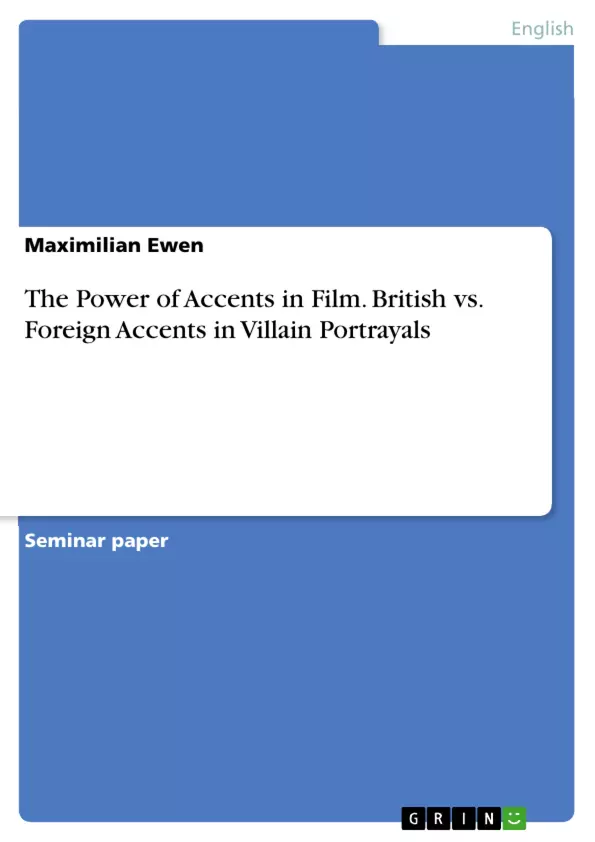This paper explores the role of accents in shaping the iconic figure of the villain in films, with a focus on the British accent, particularly 'Standard English' and 'Received Pronunciation.' By analyzing the portrayal of villains like Hans Gruber in "Die Hard" (1988), the paper investigates how accents such as British, American, German, and Asian influence audience perception. It delves into the cultural and social implications behind these accent choices, examining how they contribute to a villain's aura of sophistication or menace. Additionally, the research highlights the risks of perpetuating negative stereotypes through accent usage in film, while discussing the media's role in shaping global perceptions of foreign accents.
Inhaltsverzeichnis (Table of Contents)
- 1. Introduction
- 2. Historical Development
- 3. Varieties of Accents and Audience Perception
- 3.1 Linguistic Characteristics of Accents
- 3.1.1 American and British English
- 3.1.2 German-accented English
- 3.2 Social Attractiveness and the Prestige of Accents in the UK
- 3.3 Cultural and Social Perception of International Accents
- 3.4 Media Influence and Stereotyping
- 3.1 Linguistic Characteristics of Accents
- 4. Motivations of choosing the British Accent for Film Villains
- 4.1 The British Accent and Hierarchies
- 4.2 The Use of Accents in Contrast
- 4.3 Historical Reference and Media
- 5. Conclusion
Zielsetzung und Themenschwerpunkte (Objectives and Key Themes)
This paper investigates the prevalent use of British accents for film villains. It aims to explore the reasons behind this casting choice, analyzing the cultural, social, and linguistic factors at play. The study will also examine how audience perception of different accents impacts the portrayal of villains.
- The historical development of using British accents for film villains.
- Linguistic characteristics of British, American, and German accents and their impact on audience perception.
- The social attractiveness and prestige associated with different accents.
- The role of media and stereotypes in shaping the perception of accents.
- Motivations behind choosing a British accent for villainous characters.
Zusammenfassung der Kapitel (Chapter Summaries)
Chapter 1: Introduction introduces the topic and the research question: why is the British accent frequently used for film villains? It establishes the scope of the paper and its methodology, using Die Hard's Hans Gruber as a primary example.
Chapter 2: Historical Development traces the evolution of the British accent's use for villains throughout film history, from silent films and the Golden Age of Hollywood to modern cinema, highlighting key examples and shifts in portrayal.
Chapter 3: Varieties of Accents and Audience Perception examines the linguistic characteristics of British and American English, comparing and contrasting their sounds and how they might influence audience reception. This chapter also looks at how accents are perceived in terms of social attractiveness and prestige.
Schlüsselwörter (Keywords)
British accent, film villains, Received Pronunciation, Standard English, audience perception, stereotypes, media influence, linguistic characteristics, social attractiveness, historical development.
- Quote paper
- Maximilian Ewen (Author), 2024, The Power of Accents in Film. British vs. Foreign Accents in Villain Portrayals, Munich, GRIN Verlag, https://www.hausarbeiten.de/document/1506243


